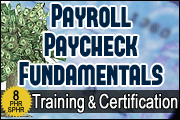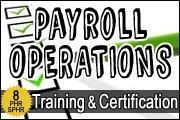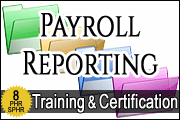Payroll Operations
Learn Proper Procedures For Handling Payroll Operations
The Basic Requirements For Payroll OperationsHandling payroll is more than just sending out paychecks. "Payroll" includes proper processing and retention of I-9s, preventing fraud, avoiding penalties, completing required reports on a timely basis, and following complex rules for documentation and recordkeeping, among others, including:

- Staying up-to-date and complying with federal, state, and local labor laws and regulations governing payroll, including minimum wage laws, overtime pay requirements, and regulations related to payroll taxes and deductions
- Maintaining accurate payroll records, such as hours worked, pay, and tips and tax amounts
- Tracking hours worked by employees accurately, whether through manual timecards, time clock systems, or electronic time tracking software. This includes recording regular hours, overtime, vacation days, sick leave, and any other types of leave
- Determining gross pay for each employee based on their hourly rate or salary, and any additional compensation such as bonuses or commissions
- Calculating deductions for taxes, insurance premiums, retirement contributions, and other withholdings
- Accounting for employee benefits such as health insurance, retirement plans, and other voluntary deductions
- Tracking, paying, and reporting Social Security, Medicare, and Federal Unemployment Tax Act (FUTA) deductions
- Tracking and processing exemptions, fringe benefits, retirement plan deductions, garnishments, levies, and other deductions
- Distributing payments through checks, paycards, and/or direct deposit
- Establishing and maintaining self-service systems, direct deposits, and paycards
- Following final and unclaimed paycheck rules
- Developing audit and disaster recovery plans
- Filing the numerous required reports on time
- Complying with various state and federal record retention requirements
And for each of the above topics, there are many sub-areas that you need to know. For example, options for collecting time and attendance include Time Sheets, Time Clocks, and Electronic Timekeeping Systems where you must decide between ease, productivity, cost, and error reduction.
Recommended Training Courses For Payroll Operations
>>> Payroll Operations Training & Certification Program
The Payroll Operations Fundamentals Training &Certification Program helps beginning and intermediate HR professionals learn the basic payroll requirements. Our Paycheck Fundamentals training course will teach you to properly:- Maintain accurate payroll records, such as hours worked, pay, and tips and tax amounts
- Track, pay, and report Social Security, Medicare, and Federal Unemployment Tax Act (FUTA) deductions
- Track and process exemptions, fringe benefits, retirement plan deductions, garnishments, levies, and other deductions

- Distribute payments through checks, paycards, and/or direct deposit
- Retain records and forms, such as I-9s and eVerify
- Comply with various wage and hour laws and IRS regulations
- Establish and maintain self-service systems, direct deposits, and paycards
- Select and implement a payroll system
- Develop audit and disaster recovery plans
- Comply with various state and federal record retention requirements
Details / Order:
https://www.payrolltrainingcenter.com/payroll-operations-training-and-certification-program-ot1000063
>>> Payroll Reporting
Most people new to handling payroll are surprised at how many forms and reports are required. Payroll reporting requirements include:- Not just Forms W-2, W-3, and 941, but how to fill them out correctly and file them timely
- How to properly report Social Security, Medicare, Fringe Benefits, Bonuses

- How to properly withhold taxes
- Knowing annual limits
- When - and how - to use the Multiple Worksite Report
- When, where, and how to file (including electronically)
- Report using alternative IRS forms
- Correct errors - even on forms already subitted!
- How to do 'Year End' and 'Year Beginning' work
Details / Order:
https://www.payrolltrainingcenter.com/payroll-reporting-training-and-certification-program-ot1000062
>>> Payroll Audits, Penalties, And Recordkeeping Requirements
Last, there is the payroll audits, penalties, and recordkeeping requirements.
A payroll audit can occur for many reasons: someone from the government comes calling because you may have done something wrong; an employee makes a claim of unfair pay practices, or; you simply decide to review your own procedures, either internally or by using and independent third party such as an accountant.
Re payroll penalties, we all know that penalties can be costly and annoying - especially if they are for an inadvertent mistake. But do you know that some of these penalties can be appealed or waived with a show of good cause?
Luckily, TrainingCenter offers training that provides you with all you need to know in order to either avoid penalties outright or to submit a penalty waiver request. This training includes tips on:
- How to avoid payroll audits and penalties
- The most common types of penalties
- How penalties are assessed
- How to read the penalty notice
- What amounts can be assessed
- Steps for getting penalties waived
- Penalty abatement techniques, including what to focus on in order to insure that your waiver request is complete and timely
Details / Order:
https://www.payrolltrainingcenter.com/how-to-do-a-payroll-audit-former-auditor-s-expert-advice-wt1000384
Find Other Payroll Operations Training Courses
Below are links for more information and courses to help you with specific payroll operations needs.
Find Seminars, Webinars, And Online Training In Your Area






